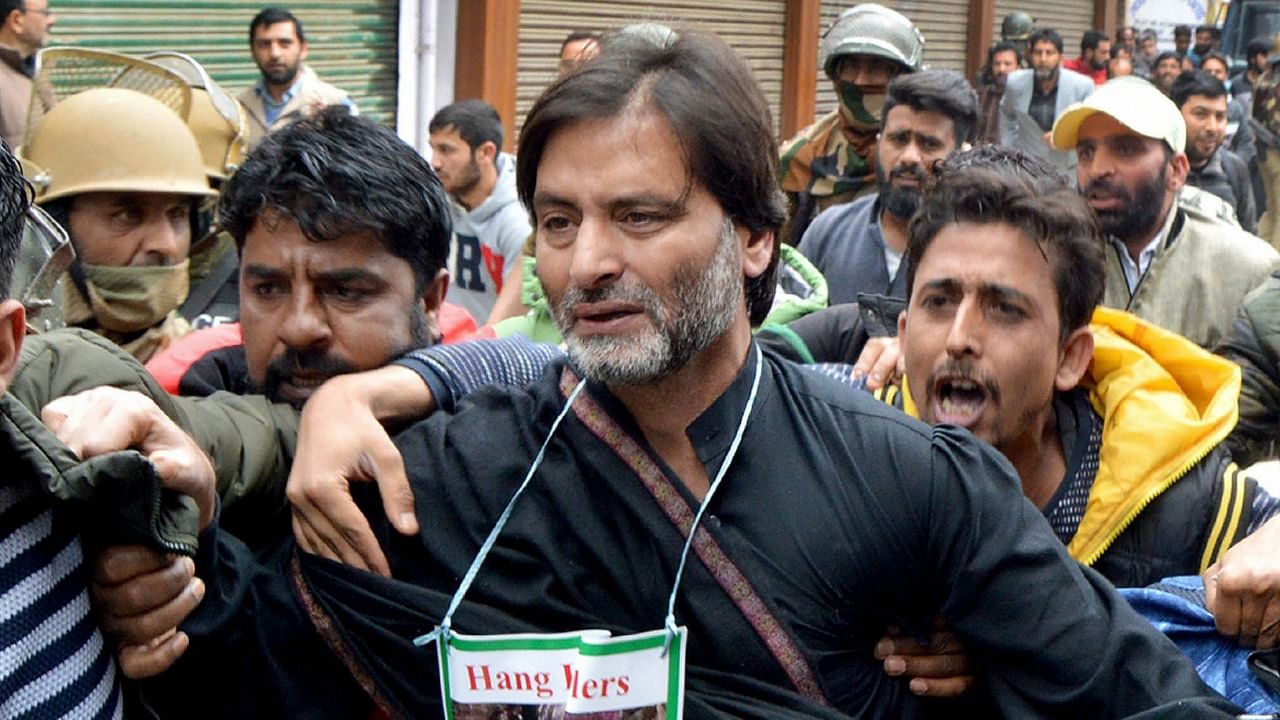
Kashmiri separatist leader Yasin Malik.
Credit: PTI File Photo
Srinagar: Continuing its crackdown on separatist groups, the Center has extended ban on the Jammu and Kashmir Liberation Front, led by incarcerated Yasin Malik, while J&K Peoples Freedom League and four factions of J&K Peoples League have also been banned under strict anti-terror laws.
Announcing the decisions, Union Home Minister Amit Shah said the Modi government is committed to suppressing terrorism ruthlessly.
“The Modi government has declared the 'Jammu and Kashmir Liberation Front (Mohd. Yasin Malik faction)' as an 'Unlawful Association' for a further period of five years. The banned outfit continues to engage in activities that foment terror and secessionism in Jammu and Kashmir. Anyone found challenging the security, sovereignty and integrity of the nation will face harsh legal consequences,” he announced on X.
The Centre also designated the Jammu and Kashmir Peoples Freedom League (JKPFL) as an 'Unlawful Organisation' under the anti-terror law for five years.
“Pursuing PM @narendramodi Ji's policy of zero-tolerance towards terrorism, the MHA has declared four factions of the Jammu and Kashmir Peoples League—namely, JKPL (Mukhtar Ahmed Waza), JKPL (Bashir Ahmad Tota), JKPL (Ghulam Mohammad Khan) and JKPL (Aziz Sheikh) led by Yaqoob Sheikh—as 'Unlawful Associations'. These organizations were involved in inciting terror and abetting secessionism in Jammu and Kashmir,” Shah said.
These separatist organisations have been accused of sowing seeds of disaffection among people, exhorting people to destabilise public order, encouraging the use of arms to separate Jammu and Kashmir from India, promoting hatred against the government, and calling for the boycott of elections on multiple occasions.
On February 27, the Center extended the ban on Jamaat-e-Islami (JeI) Jammu and Kashmir by five years. Both the JKLF and the JeI were banned by the Center initially in February 2019 following the deadly terror attack in Pulwama in which 40 paramilitary CRPF personnel were killed.
The JKLF was led by 58-year-old Malik, who is serving a life-term in Delhi’s Tihar jail in a terror financing case. Malik had joined JKLF in 1988 after the controversial 1987 assembly elections and later became JKLF chief after the killing of group’s chief Ashfaq Majeed on March 31, 1990.
He was arrested in August 1990, and charge sheet was filed by the CBI the same year, but the trial went cold. The JKLF chief was released in 1994, and J&K High Court stayed his trial in 1995.
Following his release, Malik split the JKLF. While he led the non-violent separatist faction, founder Amanullah Khan continued to lead the violent faction. He is also an accused in the December 1989 kidnapping of Rubaiya Sayeed, the daughter of then Union Home Minister Mufti Mohammad Sayeed.